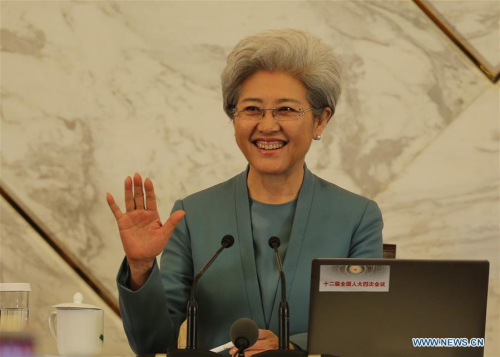
Fu Ying, spokesperson for the fourth session of China's 12th National People's Congress (NPC), attends a press conference on the session at the Great Hall of the People in Beijing, capital of China, March 4, 2016. The fourth session of the 12th NPC is scheduled to open in Beijing on March 5. (Photo: Xinhua/Chen Jianli)
A spokesperson for China's national legislature said Friday that it is the United States that is militarizing the South China Sea.[Special coverage]
Fu Ying, spokesperson for this year's annual session of the National People's Congress that will kick off Saturday, said at a press conference that currently most of the advanced aircraft and warships passing through the South China Sea belong to the United States.
Fu made remarks when answering a question from a CBS correspondent about China's construction of military facilities in the islands and reefs in the South China Sea.
She said that according to its strategy of pivot to Asia-Pacific, the United States has decided to deploy a larger part of its naval force to this region. It is also strengthening military presence in the Asia Pacific region with its allies.
"Isn't it militarization?" She asked in reply, adding that wrongly accusing China's militarization in the waters is a hegemonic act in language, which will also mislead the situation.
Most of Chinese lawmakers and ordinary people are not pleased and do not agree with the U.S. showing off military power by sending warships to waters close to the South China Sea islands and reefs.
The United States said it did not take sides in the South China Sea disputes, however, its acts and rhetoric make people feel that it is raising tensions in the region, Fu said.
China's construction projects in the South China Sea islands and reefs are necessary for providing public services and strengthening China's capacities for safeguarding regional peace.
In addition, China has never recognized some countries' illegal occupation of some islands and reefs, and China's policy of putting aside disputes and seeking joint development is based on China's sovereignty over those islands and reefs.
As the islands and reefs are far from the mainland, they should have defense capacities, but those efforts should not be described as militarization, Fu added.
"If the United States is really concerned about regional stability and peace, is should support negotiations between China and neighboring countries," according to Fu.
Read more:
China guarantees rights of lawyers to work in line with law
China guarantees the rights of lawyers to fulfill their missions in line with law, regarding them an important force in promoting the rule of law, a spokeswoman for the annual session of China's top legislature said Friday.
China sees 43 national lawmakers resign, 27 dismissed since 2013
Altogether 43 national lawmakers have resigned and 27 others were dismissed in China since 2013, largely due to graft, a spokesperson with the top legislature said Friday.
China hopes to improve philanthropy through charity law: spokeswoman
Philanthropy is developing fast in China and the nation aims to standardize it through a charity law, a spokeswoman for the annual session of the country's top legislature said Friday.
China's NPC supervision not formality: spokeswoman
China's top legislative body's supervision over law enforcement and government work is not a formality, a spokesperson said Friday.
Population policy change timely, spokesperson
China's population policy change is timely and proper as the nationwide two-child policy took effect on Jan. 1, a spokesperson for the national legislature said on Friday.
China to raise 2016 defense budget by 7-8 pct: spokesperson
China will raise its defense budget by around 7 to 8 percent this year, a spokesperson for the annual session of the national legislature said Friday.
China-Russia relations not affected by external factors: spokesperson
China-Russia relations will continue healthy development and not be affected by external factors, a spokesperson for the national legislature annual session said Friday.


















































